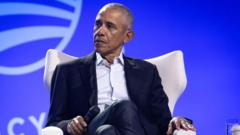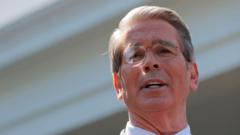The announcement of a $1 trillion military budget by President Trump has ignited a fierce debate over fiscal responsibility and America's foreign policy stance.
Trump's $1 Trillion Military Budget Sparks Debate on Fiscal Responsibility

Trump's $1 Trillion Military Budget Sparks Debate on Fiscal Responsibility
President Trump’s bold military budget proposal raises questions about his commitments to reducing government size.
In an unexpected turn of events, President Donald Trump has unveiled an unprecedented military budget proposal amounting to a staggering $1 trillion, a significant departure from his earlier promises to reduce government size and negate the nation’s heavy global military presence. The announcement came during a press conference held alongside Israeli Prime Minister Benjamin Netanyahu, where Trump confidently proclaimed, “Nobody’s seen anything like it.”
The substantial budget increase earmarks billions for enhanced military equipment and training, aimed at addressing what Trump describes as a rapidly changing global landscape rife with instability. He insisted the plan is “cost-conscious,” yet underscored the necessity to strengthen the U.S. military in light of perceived threats. “We have to be strong because you got a lot of bad forces out there now,” he stated, emphasizing a shift towards a more engaged military posture.
Reactions on social media were swift and critical, with opponents highlighting the stark contradiction between Trump’s current military ambitions and his campaign promises of restoring fiscal responsibility and moving away from America acting as the “world’s policeman.” Observers argue that the massive defense budget appears to reinforce the existing military-industrial status quo rather than initiating any fundamental change in foreign policy.
Conversely, supporters of the proposal claim that the increase serves as a necessary strategic deterrent, arguing that “peace through strength” is the best route to secure results and pointing out that adversarial nations are undoubtedly paying close attention to America’s military capabilities.





















